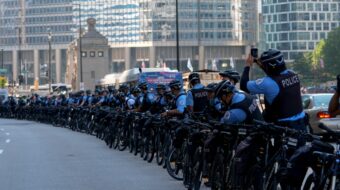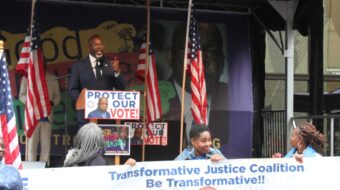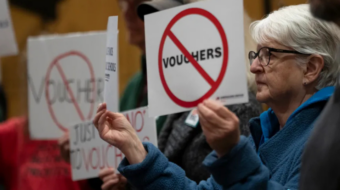CHICAGO – It’s the worst feeling, said Paula Bullard, mother of five, when you have to tell your children that their school is closing. Bullard’s children go to South Chicago elementary in the South Shore neighborhood. Their school is one of 16 public schools the Chicago Board of Education has recently decided to close, consolidate or revamp next fall.
“My oldest started crying because he won’t be able to graduate with friends he just made,” said Bullard. “I told him not to worry because mommy and daddy are going to fight to keep their school open,” she said.
Bullard was joined by hundreds of parents, teachers, students and community groups who demonstrated in front of the Board of Education building Feb. 25 in downtown Chicago. Protestors led a march chanting with signs in hand speaking out against the boards decision which they say will displace students and teachers, throw communities in turmoil, put hundreds out of work and undermine public education.
Faia Wilson has two young children who attend South Chicago. “My feelings were hurt. It’s like somebody has just died in our family. My kids school not only helps me as a parent but it helps our entire family and our community,” she said.
South Chicago like many others is slated for closure due to low-enrollment, according to school officials.
“We have good teachers and smaller classrooms work because our students do better when they’re given more attention,” said Wilson.
District officials contend 12 of the schools slated for closure are due to low enrollment while four others, they say, are academically failing and will go into a turn-around program, meaning teachers and staff will have to reapply for their jobs.
But just days prior to the board’s recent decision, the district removed six schools from the closing or revamping list. It was the mobilization of outraged parents, teachers, students, labor leaders and community groups that formed rapid-response coalitions which spoke out against the measure at public hearings and downtown protests in massive numbers.
Edna Otero has been teaching the first grade for 28 years and is an active member with the Chicago Teachers Union. She was at the rally to support her fellow teachers who are against school closings and Mayor Daley’s Renaissance 2010 plan. Critics charge the plan is part of a long-term privatization scheme of public education that targets low-income communities where populations are decreasing due to the destruction of public housing and skyrocketing rents.
“Our kids are being told that they are not good enough and every time I hear that a school is closing I feel like I’m personally being slapped in the face,” said Otero. It’s hard enough that teachers have to work with students and families who are under-privileged and it’s not right that now they are losing the one place where they feel safe, said Otero. “It’s demoralizing to everyone.”
Otero said that there are 20 pupils per classroom in the suburbs whereas there are 30 or more in Chicago schools. “And they say when that number goes down here it’s under-enrollment,” said Otero. Our kids deserve equal treatment, quality education and the highest attention and smaller classrooms benefit everyone, she said. “Get involved and go to your neighborhood school and find out what’s going on and how you can help,” said Otero. “Parents, teachers, students and communities have to work together in order to save our public schools because education is a right.”
Jackson Potter is a history teacher, an active union member and leader with the Caucus of Rank-and-file Educators. “Members of the Board of Education are cowards who can care less about the people they are impacting,” he said. “They are not closing schools because they are failing. They’re getting rid of them because they’re for sale,” added Potter. “These are business people, members of corporate boards who care more about profits and privatization than improving public education and human lives.”
Potter and rally supporters are urging people to get involved by calling their state representatives telling them to support House Bill 363 introduced by State Rep. Cynthia Soto (4th District) that would place a moratorium on school closings, phase-outs, turnarounds and consolidations. The legislation has the support of more than 20 state lawmakers and recently made it out of committee with a 20-0 vote and would require a team of experts to assemble and review cases of shutdowns and develop criteria for evaluating proposals made by school officials. The move will help facilitate a citywide plan that is expected to include a fair, democratic process with community input and oversight.
For Kristen Snyder, a college student, the mayor should be focusing on how to better fund public education and not the Olympics. Chicago is a leading contender for the 2016 games. “It’s really sad that we’re investing resources into choosing the Olympics years from now rather than investing in our much needed public schools today. What’s going to happen to low-income students who can’t afford private schools,” she asked. Closing schools, firing good teachers and displacing students is not the answer, said Snyder.
Speaking about the six schools that were saved from closing by high levels of community and parent mobilization, Potter said, “These groups were the bastions of the movement and their voice and their presence scared the board.”
Many supporters at the rally including Jesse Sharky, a social studies teacher at Senn high school were happy that the board decided to spare six schools. “We’re very excited about this, because it shows that when communities come together and are united in protest, it really works,” he said.









